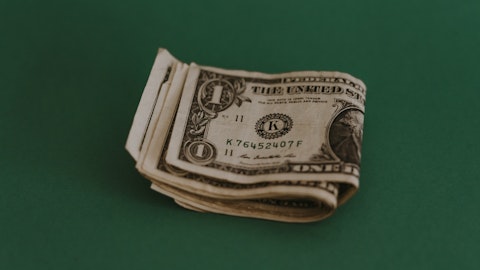We recently published a list of 12 Best Brewery Stocks to Buy According to Hedge Funds. In this article, we are going to take a look at where The Boston Beer Company, Inc. (NYSE:SAM) stands against other best brewery stocks to buy according to hedge funds.
The global alcohol industry is currently grappling with strict regulations, high taxes, inflation, and rising costs, which are likely to persist and may squeeze the profit margins of alcohol producers. The global brewing industry had been hit particularly hard as beer production worldwide fell to 1.88 billion hectoliters last year, representing a YoY decline of 0.9 %.
Peter Hintermeier, Managing Director of BarthHaas, commented:
“After we had managed to post modest growth in 2022 despite unfavorable conditions, we were expecting another small increase in 2023. However, energy, raw materials, packaging, logistics, and labor costs remained at a high level, which put pressure on the brewing business in many countries.”
READ ALSO: 10 Best Marijuana Stocks to Buy According to Hedge Funds
The American brewing industry is also faced with a declining demand, as beer consumption in the US last year fell to its lowest level since the 1970s, according to the Brewers’ Association. In fact, in 2022, the American spirits industry surpassed beer in revenue for the first time ever. The trend then continued in 2023, driven primarily by the spirits RTD category. Nevertheless, the country’s major brewers were still in good financial health, thanks to rising prices and a consumer shift towards more expensive, often imported beers.
A major factor behind the decreasing demand is also global drinking habits have shifted dramatically over the last few years. The modern consumers are increasingly focused on health and wellness and seek alternatives to traditional alcoholic beverages, giving rise to the rapidly growing low and no-alcohol trend. To make sure they don’t miss out on the opportunity, several industry behemoths have hopped on the zero-alcohol bandwagon and are now offering products with all of the taste and none of the booze.
Despite the aforementioned challenges, the alcohol sector can be an attractive option for investors looking to diversify their portfolios, simply because of the buffer it provides during tough economic times. An analysis by Goldman Sachs has revealed that beer and spirits volumes in the American market have shown little correlation with economic growth. Their sales are more related to the general trends of alcohol consumption per capita rather than the general state of the economy. This is because beer and spirits are often seen as affordable luxuries or even staples.
According to a study by Cambridge University, the decreasing levels of average per capita income lead to very small changes in gross alcohol, wine, and beer consumption. In fact, the surge in unemployment during recessions could instead trigger an increase in the average alcohol intake.
A great example of this is how Americans drank more alcohol during the pandemic and this was also reflected in the resultant imposts collected by the national kitty. Alcohol tax revenues collected by the U.S. Treasury Department rose by 8% in the fiscal year that ended on Sept. 30, 2021, compared to the previous year, and remained well above pre-pandemic levels.
Another popular investment vehicle in the alcohol industry is rare whiskeys. Aptly named ‘Liquid Gold’, this beloved liquor can preserve and even increase in value during economic instabilities, inflationary periods, and recessions. One simply cannot forget about the bottle of The Emerald Isle Collection that sold in auction earlier this year for $2.8 million, or the 1975 cask of Ardbeg single malt which was acquired by a private collector in Asia in 2022 for over $20 million, more than double the amount Glenmorangie paid for the entire Ardbeg distillery and all its stock in 1997.
The Rare Whisky 101 Apex 1000 Index tracks whiskeys that are highly sought after for collection. It has gained over 384% since 2013, against almost 301% gains by S&P’s famous benchmark of the top 500 companies for the same period. The RW Japanese 100 Index, which includes 100 collector’s bottles from Japan, has seen gains of around 350% since 2015. The index includes bottles like Ichiro’s Malt ‘Card’ Ace of Spades, Ace of Diamonds, and King of Hearts, among others.
Methodology
To collect data for this article, we scanned Insider Monkey’s database of 900 hedge funds and picked the top 12 companies operating in the brewing sector with the highest number of hedge fund investors. When two or more companies had the same number of hedge funds investing in them, we ranked them by the revenue of their last financial year instead. Following are the Beer Alcohol Stocks Held by the Most Hedge Funds.
At Insider Monkey we are obsessed with the stocks that hedge funds pile into. The reason is simple: our research has shown that we can outperform the market by imitating the top stock picks of the best hedge funds. Our quarterly newsletter’s strategy selects 14 small-cap and large-cap stocks every quarter and has returned 275% since May 2014, beating its benchmark by 150 percentage points (see more details here).

A closeup shot of a beer tap pouring a golden lager.
The Boston Beer Company, Inc. (NYSE:SAM)
Number of Hedge Fund Holders: 28
Ranking at number 6 in our list of the Best Alcohol Stocks to Buy Now is The Boston Beer Company, Inc. (NYSE:SAM), one of the largest American-owned brewing companies, best known for its flagship brands such as Samuel Adams and Truly Hard Seltzer.
Although it was among the pioneers of America’s craft brewing revolution, The Boston Beer Company, Inc. (NYSE:SAM) isn’t the small business it once was. The company declared in its Q3 2024 earnings call transcript that it had generated over $200 million in operating cash flow YTD and maintained a cash balance of $256 million at the end of the third quarter with no debt, a rarity among the massive global beer conglomerates. To return value to its shareholders, BBC has repurchased $191 million in shares this year by the end of Q3 and recently even expanded its share repurchase authorization by $400 million, bringing the total repurchase agreement to $1.6 billion.
However, The Boston Beer Company, Inc. (NYSE:SAM)’s core brands have not been doing so well lately. The company’s iconic Samuel Adams beer has seen its sales sliding for almost a decade now. The Truly Hard Seltzer brand was also down around 23% YTD through Oct. 6, according to scan data for off-premise sales by market research firm Circana. The beer-maker’s $300 million investment in Dogfish Head Brewery doesn’t seem to be going according to plan either and it has already written down around $85 million of the floundering Delaware firm, including an impairment charge of $41.2 million in the last quarter.
That said, The Boston Beer Company, Inc. (NYSE:SAM)’s key success factors include its ability to innovate, enhance supply chain efficiencies, and allocate resources strategically. As the craft beer market continues its decline, the company is focused on diversifying its portfolio of products by including flavored malt and hard seltzers, among others. BBC also recently launched a distinctly American light craft lager called Samuel Adams American Light, to make sure it keeps up with the ongoing no-lo trend. The company also continues to dominate the hard tea category and its Twisted Tea Brand enjoys a strong 85% market share, with the most successful competitive brand limited to a low single-digit share in the market.
SouthernSun Asset Management LLC stated the following about The Boston Beer Company, Inc. (NYSE:SAM) in its Q1 2024 investment letter:
“In the near term, we believe the company will remain focused on sustaining Twisted Tea’s growth, turning Truly volume trends, improving operations to enhance gross margins, and thus providing more funds to invest in its core assets as a company – its brands and its sales force. Overall, we remain confident management’s efforts and investments are likely to produce profitable growth that will reward investors over time.”
Overall, SAM ranks 6th on our list of best brewery stocks to buy according to hedge funds. While we acknowledge the potential for SAM to grow, our conviction lies in the belief that some AI stocks hold greater promise for delivering higher returns and doing so within a shorter time frame. If you are looking for an AI stock that is more promising than SAM but that trades at less than 5 times its earnings, check out our report about the cheapest AI stock.
READ NEXT: 8 Best Wide Moat Stocks to Buy Now and 30 Most Important AI Stocks According to BlackRock
Disclosure: None. This article is originally published at Insider Monkey.





